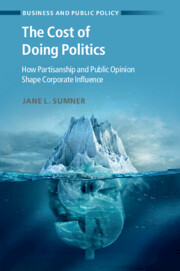Book contents
- Frontmatter
- Dedication
- Contents
- List of Figures
- List of Tables
- Acknowledgements
- 1 Introduction
- 2 Where Does Political Influence Come From?
- 3 How Does Public Opinion Shape Corporate Political Advocacy?
- 4 Why Does the Public Care About Corporate Political Influence?
- 5 Why Do Companies Care About Public Opinion?
- 6 Do Companies Try to Avoid Public Backlash?
- 7 So What and Now What? Summaries and Concluding Thoughts
- Appendix A: Interview Methods
- Appendix B: Chapter 4 Study Methodology and Full Results
- Appendix C: Chapter 5 Robustness Checks
- Appendix D: Chapter 6 Robustness Checks
- References
- Index
- Series page
3 - How Does Public Opinion Shape Corporate Political Advocacy?
Published online by Cambridge University Press: 21 April 2022
- Frontmatter
- Dedication
- Contents
- List of Figures
- List of Tables
- Acknowledgements
- 1 Introduction
- 2 Where Does Political Influence Come From?
- 3 How Does Public Opinion Shape Corporate Political Advocacy?
- 4 Why Does the Public Care About Corporate Political Influence?
- 5 Why Do Companies Care About Public Opinion?
- 6 Do Companies Try to Avoid Public Backlash?
- 7 So What and Now What? Summaries and Concluding Thoughts
- Appendix A: Interview Methods
- Appendix B: Chapter 4 Study Methodology and Full Results
- Appendix C: Chapter 5 Robustness Checks
- Appendix D: Chapter 6 Robustness Checks
- References
- Index
- Series page
Summary
In this chapter, I explain how fear of a public backlash shapes how companies engage in the political system. I outline a probabilistic chain of events that can lead from a company engaging in advocacy to being noticed and criticized by activists, to that criticism spurring a larger public response, to eventual damage to a company’s brand and reputation. Certain attributes of companies and advocacy strategies change the probability of each of these events happening, which means that (a) some companies are inherently more vulnerable than others and (b) companies can take intentional steps to reduce these probabilities in order to engage in advocacy while skirting damage. This chapter produces a set of expectations I test in the remainder of the book – that public backlash to corporate advocacy is a form of political speech and signaling rather than a statement about consumer behavior; that companies fear this backlash and “boycotts” primarily because of fear of brand damage, not necessarily sales; and that companies engage in particular strategies to either hide their political advocacy or defuse the public anger over it.
Keywords
- Type
- Chapter
- Information
- The Cost of Doing PoliticsHow Partisanship and Public Opinion Shape Corporate Influence, pp. 51 - 83Publisher: Cambridge University PressPrint publication year: 2022

